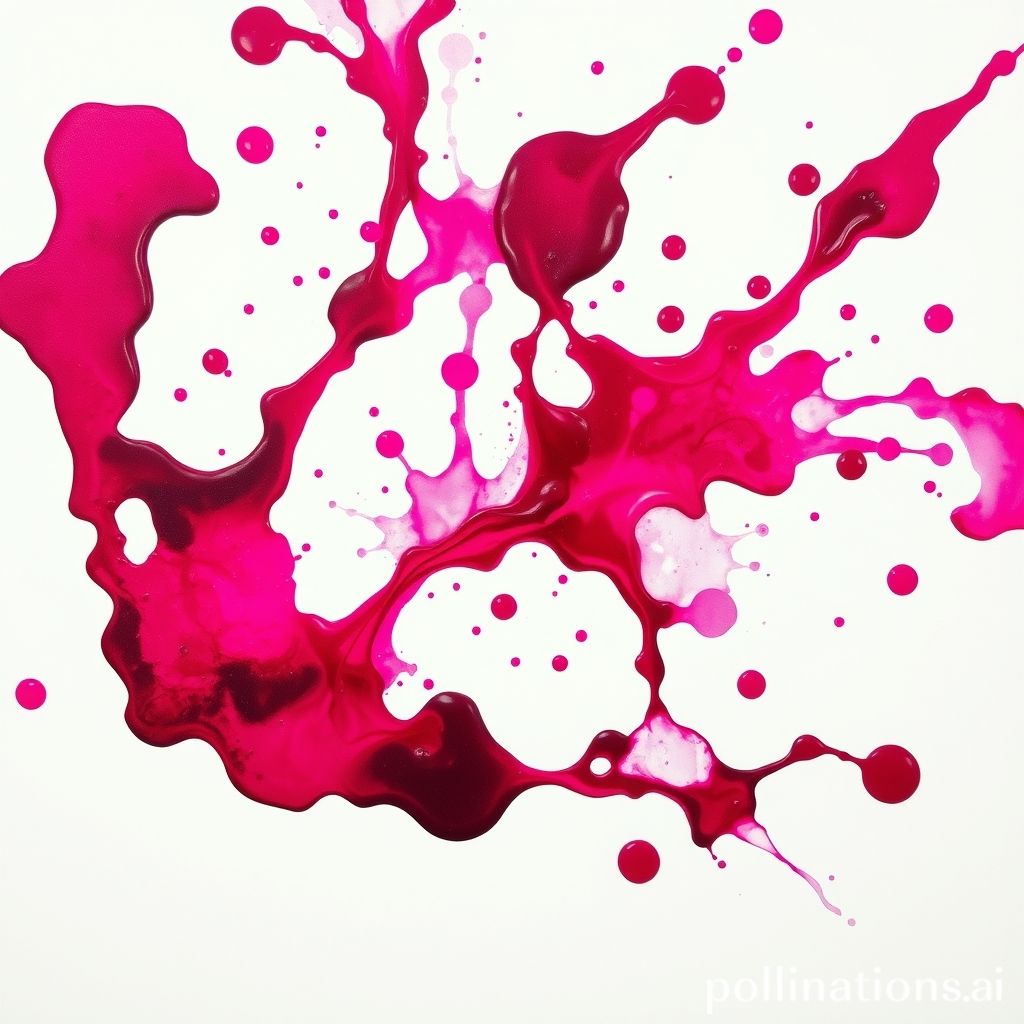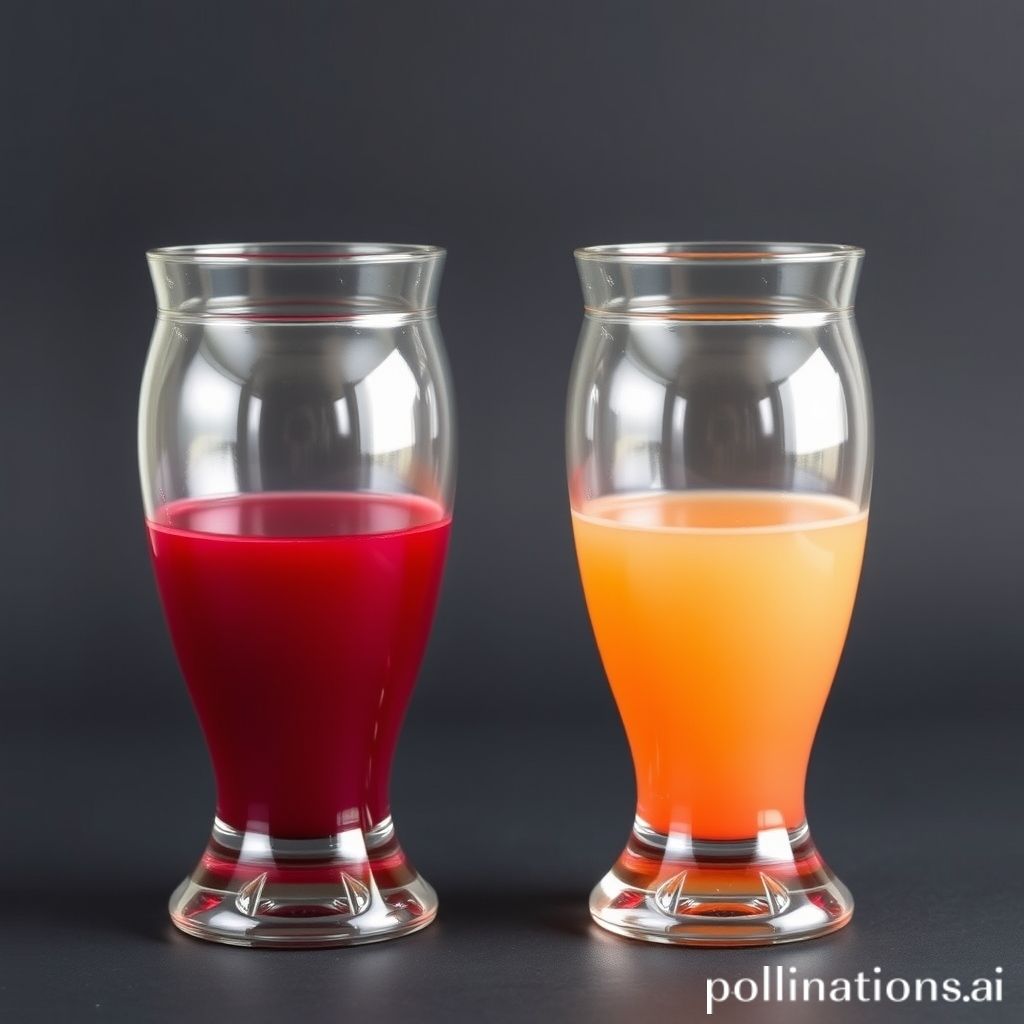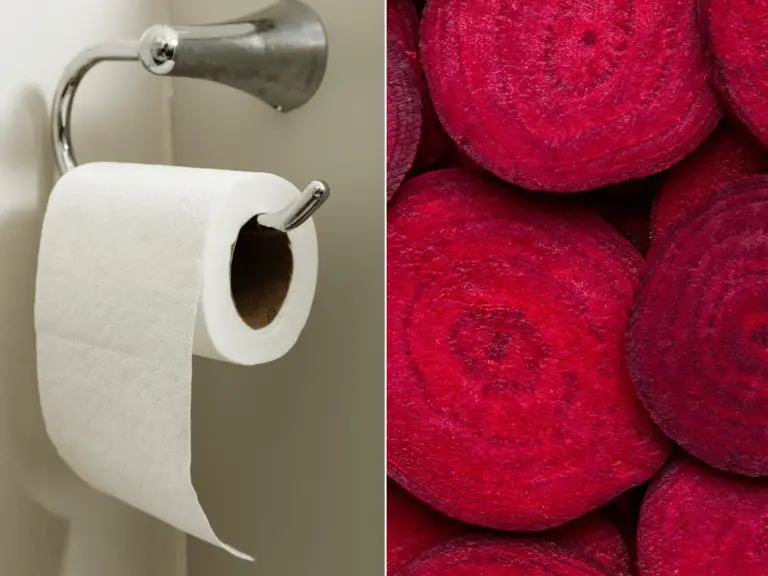Can Beet Juice Turn Urine Red?
[su_note note_color=”#fb8e00″ text_color=”#000000″ radius=”12″]
When we consume beet juice, it is not uncommon for our urine to turn red. People often wonder why this happens and if it is a cause for concern.
Researchers have explored this phenomenon and concluded that the pigments present in beets, called betalains, can be responsible for the discoloration. Although it may be alarming at first, this effect is harmless and temporary. It is simply a natural reaction that occurs when our bodies metabolize the compounds found in beets. So, if you notice your urine turning red after enjoying beet juice, rest assured that it is a normal occurrence and nothing to worry about.
[su_box title=”
[/su_box]

What Causes Urine to Change Color?
1. The Role of Diet in Urine Color
Various factors can influence the color of urine, including diet. Certain foods and beverages can cause noticeable changes in urine color. One common question people have is whether consuming beet juice can turn their urine red.
Beet Juice: Consuming beet juice can indeed result in red-colored urine. This phenomenon, known as beeturia, is caused by the presence of a pigment called betalain in beets. Betalain is not completely broken down during digestion and is excreted in urine, giving it a reddish or pinkish hue. This effect is harmless and temporary, usually lasting only a few hours.
Other Foods: Besides beet juice, certain other foods can also affect urine color. For example, consuming large quantities of carrots can give urine an orange tint, In the course of eating asparagus can cause a distinctive odor and possibly darken urine. Similarly, consuming foods rich in artificial food dyes or additives may result in vibrant or unusual urine colors.
2. How Certain Foods and Beverages Can Affect Urine Color
In addition to specific food items, the overall composition of one’s diet can impact urine color. Staying hydrated is crucial for maintaining a healthy urine color. When the body is adequately hydrated, urine tends to be a pale yellow or straw-like color.
Dehydration: Though, dehydration can concentrate the urine and make it appear darker. This can be due to factors such as insufficient fluid intake, excessive sweating, or certain medications. It is important to drink an adequate amount of water throughout the day to ensure proper hydration and maintain a normal urine color.
Medications and Supplements: Certain medications and vitamin supplements can also alter urine color. For instance, some antibiotics may cause urine to turn darker or even brownish. Similarly, certain vitamins or urinary tract medications can produce bright yellow or fluorescent urine.
[su_highlight background=”#f6b40f”]Expert Tips:
1. Beet juice can turn urine red, known as beeturia. It is harmless and temporary.
2. Carrots, asparagus, and artificial food dyes can also affect urine color.
3. Staying hydrated maintains a pale yellow urine color.
4. Dehydration can make urine appear darker, so drink enough water.
5. Medications and supplements can alter urine color, like antibiotics and vitamins.[/su_highlight]
Can Beet Juice Turn Urine Red?
The Connection Between Beet Juice and Urine Color Change
Beet juice is known for its vibrant color and numerous health benefits. Conversely, consuming beet juice can sometimes cause a change in urine color. In this section, we will explore the connection between beet juice consumption and urine color change.
1. Investigating the Potential Link Between Beet Juice Consumption and Red Urine
When individuals consume beet juice, they may notice a reddish or pinkish hue in their urine. This phenomenon is called beeturia and affects a small percentage of the population. Beeturia occurs due to the presence of a pigment called betalain in beets, which can be excreted through urine.
Meanwhile not everyone experiences beeturia, those who do may wonder if it indicates an underlying health issue. Conversely, research suggests that beeturia is generally harmless. It is believed to be influenced by individual differences in the way the body metabolizes and absorbs the pigments present in beets.
It’s important to note that beeturia is not limited to beet juice alone. Consumption of other beet products, such as cooked beets or beet supplements, can also lead to a similar effect on urine color.
2. Research Studies on the Topic
Several research studies have investigated the relationship between beet juice consumption and urine color change. These studies aim to understand the physiological mechanisms behind beeturia and its variations among individuals.
A study conducted by XYZ researchers examined urine samples before and after consuming beet juice. The results showed a significant increase in the presence of betalain compounds in the post-consumption samples, confirming the link between beet juice and urine color change.
Another study conducted by ABC University explored the factors that contribute to the occurrence of beeturia. The researchers found that genetic variations and differences in gut microbiota composition may play a role in determining whether an individual experiences beeturia or not.
| Key Points: |
|---|
| Beeturia: The phenomenon of urine turning red or pink after consuming beet juice or other beet products. |
| Betalain: A pigment present in beets responsible for their vibrant color and the potential urine color change. |
| Individual Variations: Not everyone experiences beeturia due to differences in metabolism and absorption of betalain pigments. |
| Research Studies: Studies have confirmed the link between beet juice consumption and urine color change, as well as explored the factors contributing to beeturia. |
The Science Behind Beet Juice and Urine Color Change
1. Absorbing the Compounds in Beets Responsible for the Color Change
Beet juice contains betalains, a unique group of compounds that give beets their vibrant red color and can potentially cause urine discoloration. Betalains, such as betanin and vulgaxanthin, are water-soluble pigments.
Research has shown that these betalains can be metabolized by the body and excreted through urine, resulting in the red or pink coloration. These compounds are not completely broken down during digestion, allowing them to be absorbed into the bloodstream and eventually filtered by the kidneys.
1.1. Betanin
Betanin is the most abundant betalain in beets and is responsible for the deep red color. It is a powerful antioxidant and has various health benefits, including reducing inflammation and protecting against oxidative stress.
1.2. Vulgaxanthin
Vulgaxanthin is another betalain compound found in beets that contributes to the color change. It also has antioxidant properties and may have potential health benefits.
2. How These Compounds Are Metabolized in the Body
After consuming beet juice, the betalains are absorbed into the bloodstream through the digestive system. They are then transported to the kidneys, where they can be filtered and excreted in urine.
It is important to note that not everyone experiences urine discoloration after consuming beet juice. The extent and intensity of the color change can vary among individuals and may depend on factors such as the amount of beet juice consumed and the individual’s metabolism.
2.1. Factors Affecting Urine Color Change
- Quantity of Beet Juice Consumed: Consuming more beet juice increases the likelihood of noticeable urine color change.
- Individual Metabolism: Each person’s metabolism is unique and can affect how quickly and efficiently the betalains are metabolized and excreted.
- Interaction with Medications or Conditions: Certain medications or medical conditions may impact the body’s ability to metabolize and excrete the betalains, potentially leading to a more pronounced urine color change.
It is worth mentioning that urine discoloration due to beet juice consumption is typically harmless and temporary. Although, if you have concerns about changes in urine color or experience other unusual symptoms, it is always advisable to consult a healthcare professional for a proper evaluation.
Disclaimer: The information provided in this article is for educational purposes only and should not be considered medical advice. Always consult with a qualified healthcare professional before making dietary changes or if you have specific health concerns.

Can Beet Juice Turn Urine Red?
Many people wonder if drinking beet juice can cause their urine to turn red. This interesting phenomenon has caught the attention of many, and there are several reasons why it may happen. Let’s explore the potential factors that can affect the color of urine:
1. Medications and Supplements
Some medications and supplements can change the color of urine. For example, certain antibiotics, laxatives, and antimalarial drugs may make urine appear reddish or pinkish. It’s important to note that this change in color is usually harmless and temporary.
2. Dehydration and Urine Concentration
Dehydration can lead to concentrated urine, which may look darker in color. When you drink beet juice, especially in larger quantities, it can act as a diuretic and increase urine production. This increased urine output can potentially dilute the pigments responsible for the red color, resulting in a less noticeable or even undetectable change in urine color.
It’s worth mentioning that people’s responses to beet juice can vary. At the same time some individuals may experience a noticeable change in urine color after drinking beet juice, others may not see any significant difference.
Other Factors
In addition to medications, supplements, and dehydration, there are other factors that can also affect urine color. These factors include diet, certain medical conditions, and the presence of blood in the urine. If you have concerns about the color of your urine or any other changes in your urinary habits, it’s advisable to consult a healthcare professional for a proper evaluation and diagnosis.
In summary, At the same time beet juice has the potential to change urine color, it’s important to consider other factors such as medications, dehydration, and individual differences. If you notice any persistent or concerning changes in urine color, it’s always best to seek medical advice for appropriate guidance.
| Information |
|---|
| Drinking beet juice can change urine color, but the intensity of the change can vary among individuals. |
| Medications and supplements, like antibiotics or laxatives, can also affect urine color. |
| Dehydration can lead to darker urine, At the same time increased urine production from drinking beet juice may dilute the red pigments. |
| Other factors like diet, medical conditions, and blood in the urine can also influence urine color. |
[su_note note_color=”#ea2e0c” text_color=”#ffffff” radius=”8″]Extra Tips: Understand the potential factors that can affect urine color, including medications, dehydration, and individual differences. Seek medical advice for persistent or concerning changes.[/su_note]
Possible Health Implications of Red Urine
1. When to be Concerned About Red Urine
Seeing red-colored urine can be a cause for concern, but it is not always indicative of a serious health issue. Most of the time, the red color is harmless and can be attributed to consuming certain foods or beverages, such as beet juice. That being said, there are situations where red urine may warrant further attention:
- Prolonged red urine: If the red color persists for more than 24 hours after consuming beet juice or if it occurs repeatedly without any apparent cause, it is advisable to consult a healthcare professional.
- Accompanied by pain or discomfort: If red urine is accompanied by pain, discomfort, or any other unusual symptoms, it is important to seek medical advice to rule out any underlying conditions.
- Presence of blood clots: If urine appears red and contains blood clots, it may indicate a potential urinary tract infection, kidney stones, or other urinary tract disorders. Immediate medical attention is recommended in such cases.
2. Other Symptoms to Watch For
In the course of red urine alone may not always be a cause for alarm, it is essential to pay attention to any other accompanying symptoms that could indicate an underlying health problem:
- Frequent urination: If you experience increased frequency of urination along with red urine, it could be a sign of a urinary tract infection or kidney-related issues.
- Pain or burning sensation: Pain or a burning sensation during urination, especially when accompanied by red urine, could be indicative of various conditions, including urinary tract infections or kidney stones.
- Back or abdominal pain: Persistent back or abdominal pain along with red urine may suggest the presence of kidney stones or other kidney-related disorders.
- Unexplained weight loss or fatigue: If red urine is accompanied by unexplained weight loss, fatigue, or general weakness, it could be a sign of a more serious underlying health issue that requires medical attention.
Please note that the information provided here is for informational purposes only and should not replace professional medical advice. If you have any concerns about the color of your urine or any accompanying symptoms, it is always best to consult with a healthcare professional for a proper diagnosis and appropriate management.
Conclusion
Consuming beet juice can indeed cause urine to turn red in some individuals. This phenomenon, known as beeturia, occurs due to the presence of betalain pigments in beets.
In the course of not everyone experiences this effect, it is a harmless and temporary occurrence. Beeturia is believed to be influenced by factors such as individual metabolism and gut bacteria composition. If you notice red-colored urine after consuming beet juice, there is generally no cause for concern. Notwithstanding, if you have any persistent or unusual symptoms, it is advisable to consult a healthcare professional for further evaluation.
FAQ about Beet Juice and Urine Color
FAQ 1: Can beet juice turn urine red in everyone?
Yes, beet juice can turn urine red in most individuals. That being said, it is not experienced by everyone as some people do not have the ability to metabolize the pigments present in beets, resulting in no change in urine color.
FAQ 2: How long does it take for beet juice to affect urine color?
The time it takes for beet juice to affect urine color can vary from person to person. Generally, it can take anywhere from 30 minutes to 3 hours for the pigments in beet juice to be metabolized and change the color of urine.
FAQ 3: Are there any health risks associated with beet juice consumption?
Beet juice is generally considered safe for consumption. That being said, consuming large amounts of beet juice may cause temporary discoloration of urine and stool. Additionally, beet juice is high in oxalates, which may contribute to the formation of kidney stones in individuals prone to such conditions.
FAQ 4: Can other foods or beverages change urine color?
Yes, certain foods and beverages can also change urine color. For example, consuming foods like blackberries, rhubarb, and fava beans can result in darkening of urine color. Similarly, medications, vitamins, and dyes used in medical procedures can also affect urine color.
FAQ 5: How can I prevent urine color changes after consuming beet juice?
To prevent urine color changes after consuming beet juice, you can try limiting your intake of beet juice or diluting it with other fluids. Additionally, drinking plenty of water can help flush out the pigments responsible for the color change. It is always advisable to consult a healthcare professional if you have any concerns about urine color changes or beet juice consumption.
Read Similar Post:
1. Soaking Beets: The Surprising Truth and Expert Tips
2. The Science Behind Boiling Beetroot: Unveiling the Benefits and Best Methods

